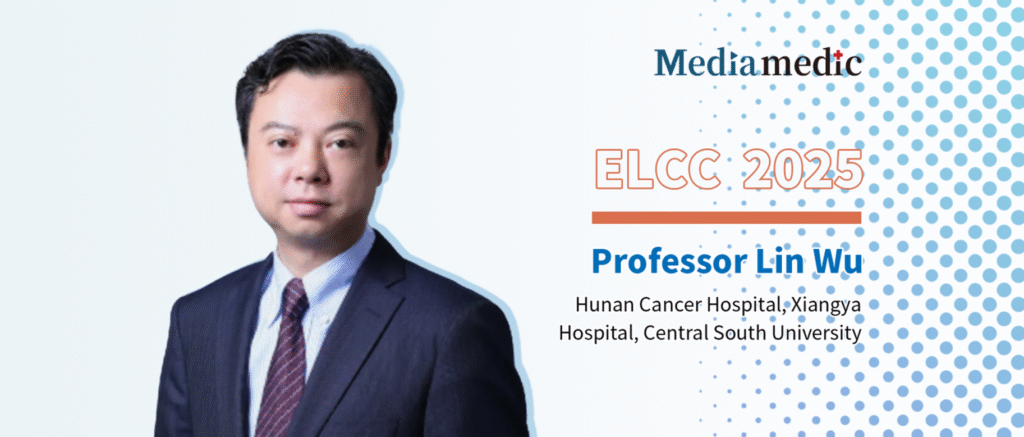
At the 2025 European Lung Cancer Congress (ELCC), the team led by Professor Lin Wu from the Hunan Cancer Hospital, Xiangya Hospital, Central South University, presented long-term follow-up data on ASK120067 (rezivertinib) in patients with locally advanced or metastatic EGFR T790M-mutant non-small cell lung cancer (NSCLC). Oncology Frontier invited Professor Wu to comment on the key findings and clinical implications of the study for our readers.Professor Lin Wu:On January 16, 2025, the National Medical Products Administration (NMPA) approved rezivertinib (ASK120067), a third-generation EGFR-TKI, for the treatment of adult patients with locally advanced or metastatic non-small cell lung cancer (NSCLC) harboring the EGFR T790M mutation, whose disease has progressed during or after EGFR-TKI therapy. The overall survival (OS) data presented in this study, along with the post hoc analysis, provide valuable supplemental evidence supporting the clinical use of rezivertinib in this patient population.
Through dose adjustment, the study further optimized the balance between efficacy and safety, offering a promising direction for personalized dosing strategies. The findings demonstrated that even when the dose was reduced to 80 mg twice daily, rezivertinib maintained significant efficacy, with the dose-reduction group achieving a median OS of 42.5 months. This is a particularly encouraging result, suggesting that dose reduction may preserve therapeutic efficacy while mitigating treatment-related toxicity.
Additionally, the incidence of adverse events (such as diarrhea and rash) was lower in the dose-reduction group, indicating that tailored dosing could enhance both tolerability and patient adherence to treatment.
However, it is important to note that these results were derived from a post hoc analysis and should be interpreted with caution. Further validation in prospective, randomized controlled trials is needed. Future studies may continue to refine dosing strategies and explore the potential for combining rezivertinib with other treatment modalities, such as immunotherapy or chemotherapy.
Reference:
Wu L, et al. Long-term follow-up of limertinib (ASK120067) in patients with locally advanced or metastatic EGFR T790M NSCLC: A multicentre, single-arm, phase IIb study. 2025 European Lung Cancer Congress (ELCC), Abstract 66P.

Chief Physician, Doctoral Supervisor, and Postdoctoral Mentor
Director of the Department of Medical Oncology, Hunan Cancer Hospital (Xiangya Hospital, Central South University)
Director of Thoracic Oncology Unit II
Director of the Hunan Province Lung Cancer Clinical Research Center
National and Regional Leadership Roles:
- Vice Chair, Geriatric Oncology Committee, Chinese Anti-Cancer Association
- Vice Chair, Committee on Palliative Oncology, Chinese Medical Doctor Association
- Executive Council Member, Chinese South West Oncology Group (CSWOG)
- Deputy Chair and Secretary General, Lung Cancer Committee, CSWOG
- Vice Chair, Lung Cancer Committee, Chinese Association of Gerontology and Geriatrics
- Member, Medical Oncology Committee, Chinese Society of Clinical Oncology (CSCO)
- Council Member, CSCO
- Standing Committee Member, Chemotherapy Committee, Chinese Anti-Cancer Association
- Standing Committee Member, Committee on Cancer of Unknown Primary and Multiple Primary Cancers, Chinese Anti-Cancer Association
- Standing Committee Member, Rare Tumors and Geriatric Oncology Committees, CSCO
Provincial Leadership Roles (Hunan):
- President, Cancer Prevention and Treatment Branch, Hunan Health Services Association
- Chair, Chemotherapy Committee, Hunan Anti-Cancer Association
- Vice President, Oncology Physician Branch, Hunan Medical Doctor Association
- Vice Chair, Lung Cancer Committee, Hunan Anti-Cancer Association
- Vice Chair, Targeted Therapy Committee, Hunan Anti-Cancer Association
- Chair-Elect, Precision Oncology Committee, Hunan Anti-Cancer Association


